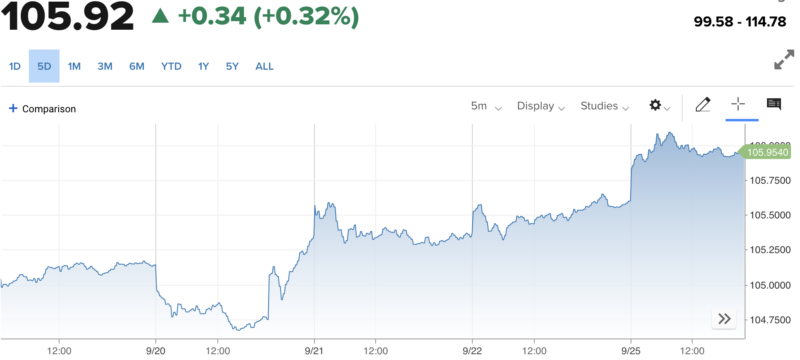
It’s Finally Happened…The Global Economy May Not Survive This

The financial world was recently abuzz with news that the U.S. dollar index (DXY) broke through a critical resistance level, signaling potential upheaval for the global economy. This development has far-reaching implications, especially when considering the vast amount of global dollar-denominated debt and the intricate web of financial derivatives. This article delves into the complexities of this situation, its impact on global economies, and what it could mean for the future.
The Dollar’s Breakthrough

The DXY recently surged past the 106 mark, breaking through a resistance level that had been tested multiple times over the past year. This move has analysts and investors alike concerned about the ramifications for global dollar-denominated debt and the stability of the world’s financial systems. The next resistance level is around 113, but if the dollar continues its ascent and we enter a recession, we could see it skyrocket to 120 or even 130.
Why Does a Strong Dollar Matter?
At first glance, a strong dollar might seem like a positive development for the United States. However, the reality is far more complex. A rising dollar increases the burden of dollar-denominated debt for countries and companies that earn revenue in other currencies. For example, China’s real estate giant Country Garden faces a debt maturity of $14.9 billion in the next year, much of which is dollar-denominated. As the dollar rises, the debt burden becomes increasingly onerous, putting financial strain on such entities.
The Domino Effect
The ripple effects of a strong dollar are felt across the global economy. A rising dollar could lead to a liquidity crunch, affecting even U.S. banks that act as intermediaries in the global financial system. A Bank for International Settlements (BIS) report highlighted the off-balance-sheet dollar debt held by U.S. banks, emphasizing their role as key intermediaries. If these banks face a liquidity crunch, it could lead to a cascade of financial instability worldwide.
The China Factor
China’s economy is particularly vulnerable to a strong dollar. With a significant portion of its wealth tied up in real estate and a large amount of dollar-denominated debt, a rising dollar could spell disaster. The Chinese property market is already showing signs of strain, and a strong dollar could exacerbate the situation, leading to a potential economic crisis not just in China but globally.
The Plaza Accord 2.0: A Potential Solution?
If the dollar continues its upward trajectory, central planners may have no choice but to intervene. A new Plaza Accord, similar to the agreement reached in the 1980s to devalue the U.S. dollar, could be on the horizon. However, this comes with its own set of challenges and uncertainties. The United States could weaponize the dollar to weaken its adversaries, but this would be a double-edged sword, potentially harming the U.S. in the long run.
The recent surge in the U.S. dollar is more than just a headline—it’s a potential tipping point for the global economy. The rising dollar could strain dollar-denominated debt, disrupt global liquidity, and even lead to economic crises in vulnerable countries like China. While interventions like a new Plaza Accord could provide a temporary solution, the complexities of the situation make it a topic that warrants close attention. If the dollar continues its ascent, the world watches with bated breath, aware that the implications are far-reaching and potentially dire.
Reach out for the rebel capitalist channel for more insight.
